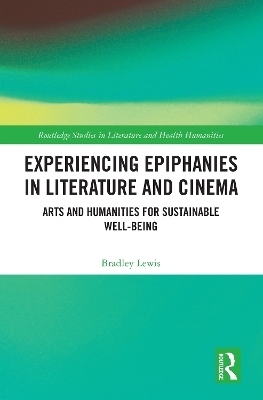
Experiencing Epiphanies in Literature and Cinema
Routledge (Verlag)
978-1-032-29448-3 (ISBN)
Experiencing Epiphanies in Literature and Cinema uses health humanities and psychological humanities to explore literary and cinematic epiphanies. James Joyce first adopted the term “epiphany” from its religious use to articulate momentsof luminous intensity or “sudden spiritual manifestation.” This study develops and extends Joyce’s use of epiphany through a range of literary and cinematic examples, from William Shakespeare to Ruth Ozeki and from Yasujirō Ozu to Jim Jarmusch. This wealth of epiphanies in the arts is important from a health humanities perspective in that they provide access to aesthetic and sustainable experiences of well-being, joy, and human flowering. They also provide antidotes to aesthetics of anti-epiphany—a showing forth of terror, horror, and panic. Experiencing Epiphanies is accordingly both critical and affirmative, diagnostic and therapeutic. It uses critique to understand the increasing need for well-being in contemporary times, and it uses affirmation to develop underutilized resources in the arts for transforming, configuring, and refiguring our everyday lives.
Bradley Lewis, MD, PhD, has dual degrees in psychiatry and interdisciplinary humanities. He is a practicing psychiatrist, psychotherapist, and professor of health humanities and cultural/disability studies at New York University’s Gallatin School of Individualized Study. He works at the interface of psychiatry, healthcare, humanities, arts, mad studies, disability studies, cultural studies, and religious studies. His books include Narrative Psychiatry: How Stories Shape Clinical Practice and Depression: Integrating Science, Culture, and Humanities. He is also co-editor of the forthcoming Mad Studies Reader.
Introduction: Artistic Epiphanies and Arts for Health
PART I: LITERATURE
1.) Experiencing Epiphanies: James Joyce, Modern Secularity, and “The Dead”
2.) Epiphanies before Joyce: Hamlet
3.) Epiphanies before Joyce: Wordsworth to Chekhov
4.) Epiphanies after Joyce: Woolf to Ozeki
Part II: CINEMA
5.) Epiphanies in Post-WWII European Art Cinema
6.) Transcendental Style and Slow Cinema
Conclusion: Sustainable Well-being in Practice: Paterson, One Window’s Light, and Shared Reading
| Erscheinungsdatum | 10.07.2024 |
|---|---|
| Reihe/Serie | Routledge Studies in Literature and Health Humanities |
| Zusatzinfo | 2 Line drawings, black and white; 25 Halftones, black and white; 27 Illustrations, black and white |
| Verlagsort | London |
| Sprache | englisch |
| Maße | 152 x 229 mm |
| Gewicht | 453 g |
| Themenwelt | Geisteswissenschaften ► Geschichte |
| Geisteswissenschaften ► Psychologie ► Allgemeine Psychologie | |
| Geisteswissenschaften ► Psychologie ► Sozialpsychologie | |
| Geisteswissenschaften ► Sprach- / Literaturwissenschaft ► Anglistik / Amerikanistik | |
| Geisteswissenschaften ► Sprach- / Literaturwissenschaft ► Literaturwissenschaft | |
| Medizin / Pharmazie | |
| Sozialwissenschaften ► Kommunikation / Medien ► Medienwissenschaft | |
| ISBN-10 | 1-032-29448-5 / 1032294485 |
| ISBN-13 | 978-1-032-29448-3 / 9781032294483 |
| Zustand | Neuware |
| Haben Sie eine Frage zum Produkt? |
aus dem Bereich


